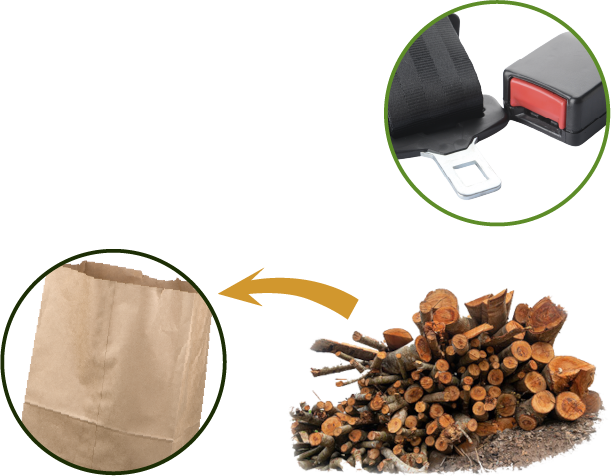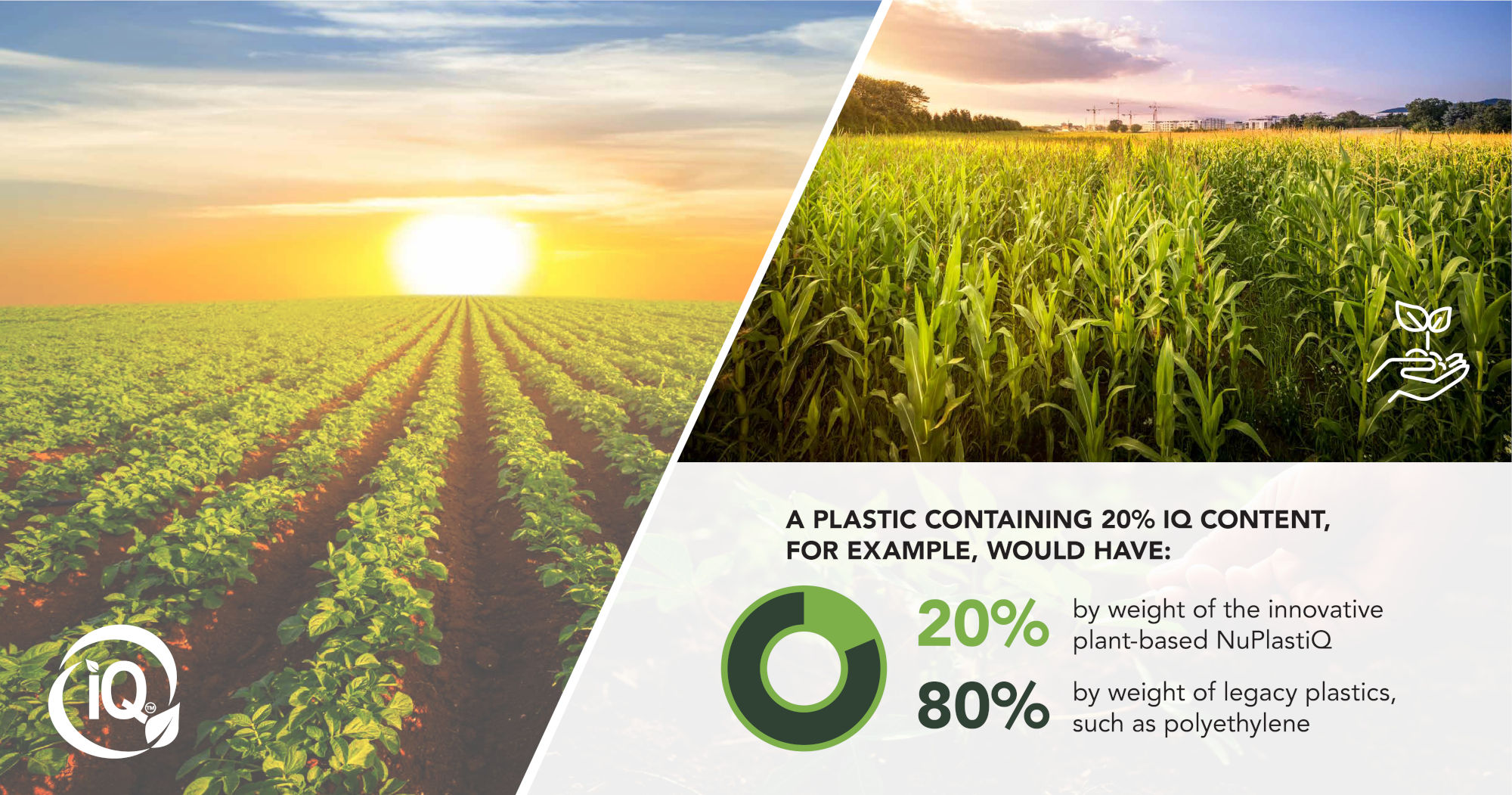

Packaged with iQ™
Our Mission Is To Reduce
Plastics Pollution.

Plastics are incredibly important to the world in so many ways:
Plastic Saves
Money, the Environment,
Food, and Lives:

- To replace all of the plastic bags in Europe with paper ones would require cutting down 2.2 Million trees preventing over 2200 Metric tones of CO2 being absorbed by those trees.
- Washing machine drums reduce water consumption 40%-50%
- Production of plastic bags consumes less than 4% of the water used to produce an equal number of paper bags. Moreover, it takes 7 trucks to deliver the same number of plastic bags.
- Plastic packaging can more than triple the time fruit and veg remains fresh, and each pound of plastic can reduce food waste by 1.7lbs.
- Just 2lbs of plastic can deliver over 10lbs of a beverage.
- Seatbelts made with high strength plastic reduce fatal injuries in vehicles between 45% & 60%
Unfortunately, the plastic produces more pollution than we can handle and we need solutions to curb the expansion of plastic pollution.
LET’S BEGIN BY LOOKING AT
WHAT NEEDS TO CHANGE:
Plastic is fantastic. But our grandchildren shouldn’t be the ones left to deal with our plastic pollution.
Plastic has changed our world for the better, contributing to great leaps forward in medicine, technology, transportation, and food safety. In fact, our world could not function the way that it does today without plastic. The Covid-19 pandemic has emphasized the essentiality of plastic in the medical community. Imagine battling the spread of a contagion without the single use gloves, masks, and other medical equipment that are all made with plastic. Now, imagine where all that plastic will end up potentially remaining for your grandchildren’s grandchildren to deal with.
Durability is a two-edged sword:

As much as we reduce, reuse, recycle and improve waste collection infrastructure, a significant amount of plastic will continue to get into our oceans.
Once there, durable plastics accumulate. The EMF estimates that by 2050 there could be more plastic than fish in our oceans…
Plastics’ durability in the environment
needs to change. It is urgent.
OUR “PLASTICS WITH iQ“
VISION:
We modify the durability-profile of mainstream plastics:
Improve biodegradation* of plastics that reach biologically-active environments like our oceans (unfortunately expected to be no less than 5 million tons per year) while maintaining durability during normal use, reuse and recycle.
Put differently, we aspire for mainstream plastics to behave like wood. Durable in normal use, however more compatible with nature’s biodegradation systems.
Make no mistake: Plastic with iQ will NOT immediately disappear when entering the oceans, but it is a step in the right direction, remaining durable for most uses while having demonstrated potential for significantly quicker biodegradation*.
*Virtually all products impact the environment. Improving biodegradation alone doesn’t render a product sustainable. But it has potential to reduce plastics pollution. Plastics with 20% iQ have demonstrated up to 100% biodegradation in as little as one year under non-typical conditions (ideal ASTM D5511 and D5338). Plastics with 1% iQ have demonstrated 40% biodegradation in two years under the same non-typical conditions, no evidence of further biodegradation. Biodegradation of plastics with iQ in typical conditions (e.g., oceans) is currently being evaluated, but it is already demonstrated that replacing some polyethylene (PE), polypropylene (PP) and polystyrene (PS) by NuPlastiQ can only reduce the total amount of persistent plastics (and microplastics).

As much as we reduce, reuse, recycle and improve waste collection infrastructure, a significant amount of plastic will continue to get into our oceans.

“iQ” is short for NuPlastiQ, an innovative plant-based plastic invented by BioLogiQ, Inc.
NuPlastiQ begins life as starch. Once modified, it is incorporated in legacy plastics in quantities that range from 1 to 40%.

Benefits from adopting plastics with iQ include:
Plant-based content reduces the need for oil-based resources in plastics production
Reduced carbon footprint when compared to fossil-based plastics (NuPlastiQ resin has a carbon neutral cradle-to-gate carbon footprint)**
Demonstrated potential for quicker biodegradation under non-typical conditions (ideal ASTM D5511 and D5338)
** Similarly to paper, plastics that end up biodegrading will naturally emit green house gases leading to an increased carbon footprint when compared to non-biodegradable plastics.

BIODEGRADATION
In the
Real World
While there’s still plenty to learn, we know that iQ increases real-world biodegradation. It is fair to state that adding NuPlastiQ to PE, PP and PS can only reduce the total amount of plastics (and microplastics) that will persist in our oceans:
Best case: While not fully demonstrated, iQ may cause mainstream plastics to fully biodegrade in decades instead of centuries. Tests under ASTM D6691-09: “Standard Test Method For Determining Aerobic Biodegradation Of Plastic Materials In The Marine Environment By A Defined Microbial Consortium Or Natural Sea Water Inoculum” indicate that 20% iQ helped a polyethylene and a polypropylene blend to biodegrade 45-55% in 3 years.
Worst case: It is expected that exposed iQ content will biodegrade as the blend naturally micronizes (as a pure PE, PP and PS would), reducing total load of more persistent microplastics in the ocean.
Increased biodegradability doesn’t make it ok to throw plastics in the environment. But it does give nature a better chance to remediate some of our unavoidable messes.
HOW TO FURTHER SUPPORT PLASTICS WITH iQ:
If you agree with iQ’s vision of reducing plastics pollution, we invite you to become an iQ supporter.
3Rs
Educate friends an family on the
need of continued 3Rs (reduce,
reuse and recycle)
Infrastructure
Scan your community for infrastructure issues that might be allowing plastics to leak into the environment (e.g., wind blowing bags from a trash can, areas without waste collection, etc.)
The 4th R – Remediate
Show your support for “remediation” technologies (like plastics with iQ) that improve nature’s ability to remediate environmental harm caused by humans
THE PLASTICS
WITH iQ STORY

Interested in learning more about how iQ technology came about?
It all started with potatoes.
In 2011, under Brad LaPray’s leadership, friends and family in the farming community of Idaho Falls (US) founded BioLogiQ with the objective to create a new bioplastic made from potatoes. They called it NuPlastiQ.
The original intention was to reduce the need for oil-based resources in plastics production.
But a happy accident led to NuPlastiQ’s unique properties… helping other mainstream plastics, such as polyethylene, polypropylene and polystyrene biodegrade faster!
By 2017 NuPlastiQ was commercially available and conquering applications around the world.
BioLogiQ evolved to become a global corporation in 2019 thanks to significant financial backing by the Choi family, enabling a 10X capacity scale up with new facilities in Idaho Falls (US) and Shaoguan (China).
Significant funds have been dedicated to biodegradation studies: since 2017, BioLogiQ has been working with 3rd party labs and universities from around the world to further understand the unexpected — but very welcome — combined biodegradation of NuPlastiQ established plastic resins.



